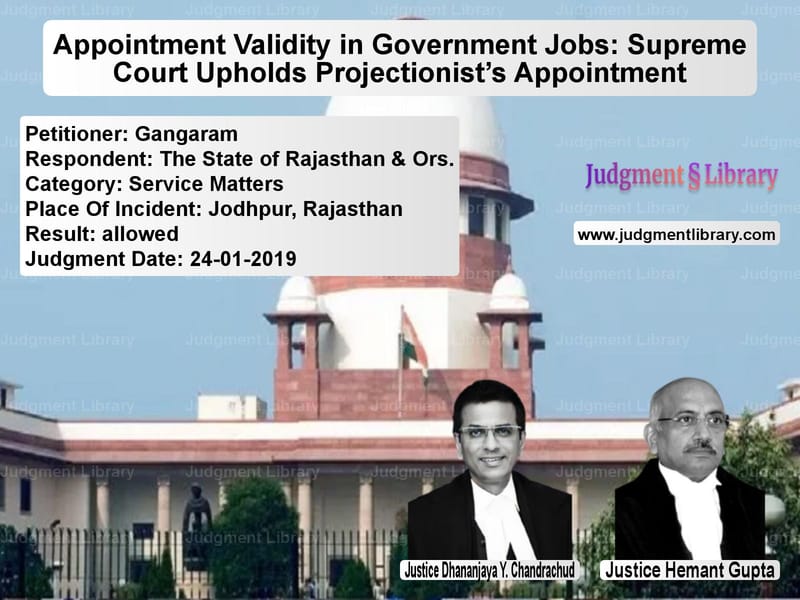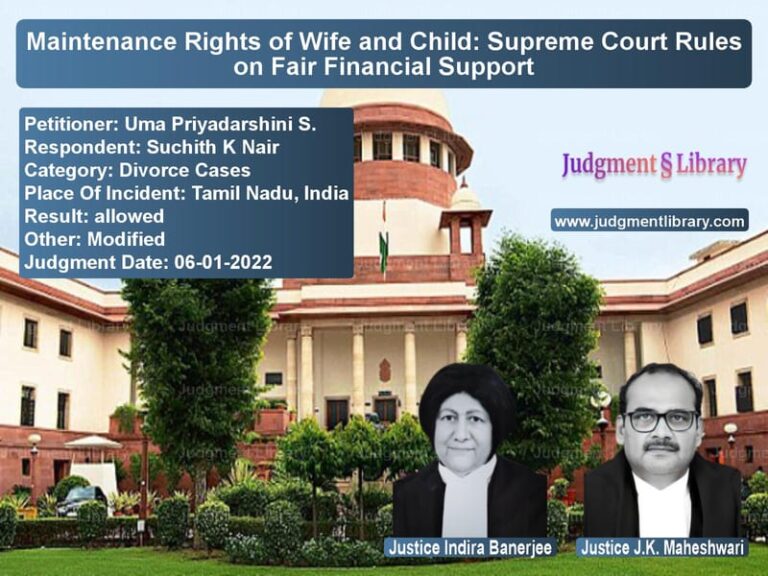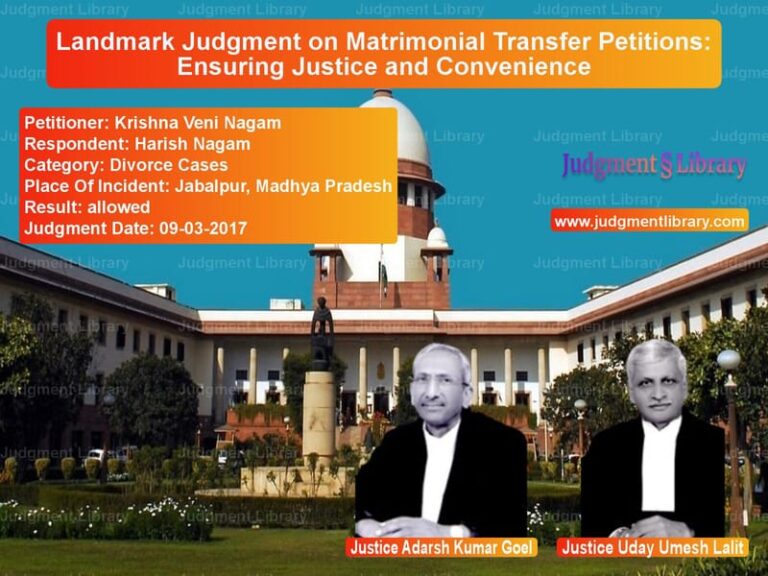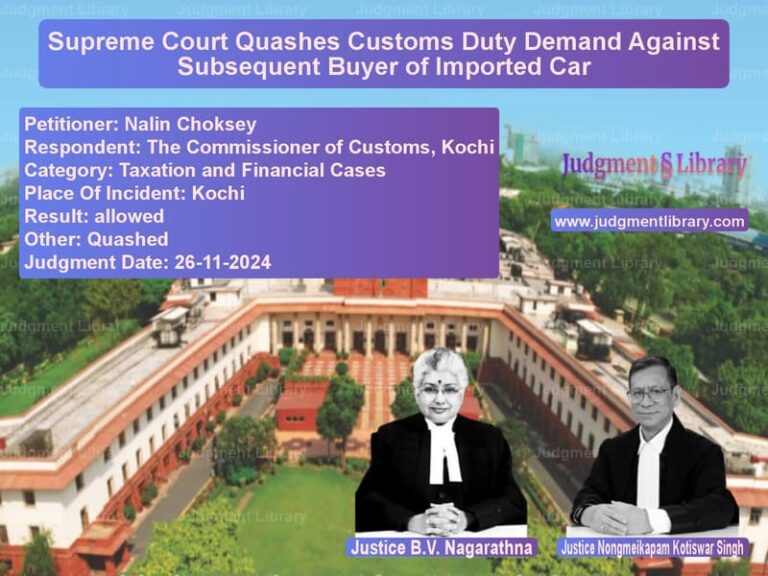Appointment Validity in Government Jobs: Supreme Court Upholds Projectionist’s Appointment
The case of Gangaram vs. The State of Rajasthan & Ors. is an important judgment that addresses the validity of government job appointments when eligibility criteria are questioned. The Supreme Court of India, in its ruling on January 24, 2019, overturned the Rajasthan High Court’s decision, reinstating the appointment of Gangaram as a Projectionist in a government medical college.
This ruling clarifies the extent to which courts can interfere in appointments and reaffirms the principle that minor procedural delays in obtaining licenses should not invalidate otherwise lawful employment.
Background of the Case
The dispute arose when the State of Rajasthan advertised a vacancy for a Projectionist at Dr. S.N. Medical College, Jodhpur, in 1991. The appellant, Gangaram, applied for the post and was appointed after due process. However, his appointment was later challenged on the grounds that he did not possess the required cinema operator license at the time of application.
Key Facts
- The advertisement for the Projectionist post was issued on August 26, 1991.
- The eligibility criteria required a higher secondary qualification and a cinema projector operator license.
- Gangaram applied for the position and was placed first in the selection list.
- The third respondent challenged his appointment, claiming he did not possess the required license at the time of application.
- The Single Judge of the High Court dismissed the petition, ruling that the license was a certification of skill rather than a prerequisite.
- The Division Bench reversed the Single Judge’s ruling and set aside Gangaram’s appointment.
- Gangaram appealed the decision to the Supreme Court.
Legal Proceedings
High Court’s Decision
The Rajasthan High Court’s Division Bench ruled that Gangaram was ineligible for the appointment as he had not submitted a valid license by the last date of application. The Court reasoned:
“The application must be accompanied by all necessary certificates, and failure to provide the required documents at the time of application renders the candidate ineligible.”
The High Court quashed Gangaram’s appointment and directed the authorities to consider the third respondent’s candidature instead.
Supreme Court’s Observations
The Supreme Court, after reviewing the case, found that the High Court’s ruling was flawed. It referred to Rule 68 of the Rajasthan Cinemas (Regulation) Rules, 1959, which states that a cinema operator must obtain a certificate from the Electric Inspector within three months of appointment.
“Sub-rule (2-A) of Rule 68 does not require possession of a license on the date of appointment. Acquisition within three months is permissible under sub-rule (2-A).”
The Court further emphasized that Gangaram had obtained the license within the prescribed time and that setting aside his appointment after nearly three decades would be unjust.
Key Legal Issues
Arguments by the Petitioner (Gangaram)
- The job posting did not explicitly state that the license had to be submitted along with the application.
- Under Rule 68(2-A), he was allowed to obtain the license within three months of appointment.
- He had served in the position for nearly 28 years, and removing him now would cause undue hardship.
Arguments by the Respondents (State of Rajasthan & Third Respondent)
- The appointment was invalid because Gangaram did not hold the required license at the time of application.
- The selection process should have ensured that only fully qualified candidates were appointed.
- The third respondent was a valid contender for the post and should have been considered.
Supreme Court’s Final Judgment
The Supreme Court ruled in favor of Gangaram, stating that:
- The requirement for a license was not an absolute bar at the time of application.
- Gangaram obtained the license within the permitted three-month window.
- His 28 years of service could not be disregarded on a minor technicality.
- The High Court erred in setting aside the appointment.
The Court concluded:
“For the above reasons, we are of the view that the Division Bench of the High Court was in error in setting aside the appointment of the appellant and interfering with the judgment of the learned Single Judge.”
Conclusion
This case sets an important precedent regarding public employment disputes. It reinforces that:
- Procedural delays in obtaining licenses should not lead to automatic disqualification.
- Candidates should be allowed to complete formalities within a reasonable period if the law permits.
- Long-standing employees should not be removed on minor technicalities.
The Supreme Court’s decision protects employees from unjust termination and ensures that job eligibility criteria are interpreted in a fair and reasonable manner.
Petitioner Name: Gangaram.Respondent Name: The State of Rajasthan & Ors..Judgment By: Justice Dhananjaya Y. Chandrachud, Justice Hemant Gupta.Place Of Incident: Jodhpur, Rajasthan.Judgment Date: 24-01-2019.
Don’t miss out on the full details! Download the complete judgment in PDF format below and gain valuable insights instantly!
Download Judgment: Gangaram vs The State of Rajasth Supreme Court of India Judgment Dated 24-01-2019.pdf
Direct Downlaod Judgment: Direct downlaod this Judgment
See all petitions in Employment Disputes
See all petitions in Recruitment Policies
See all petitions in Judgment by Dhananjaya Y Chandrachud
See all petitions in Judgment by Hemant Gupta
See all petitions in allowed
See all petitions in supreme court of India judgments January 2019
See all petitions in 2019 judgments
See all posts in Service Matters Category
See all allowed petitions in Service Matters Category
See all Dismissed petitions in Service Matters Category
See all partially allowed petitions in Service Matters Category







